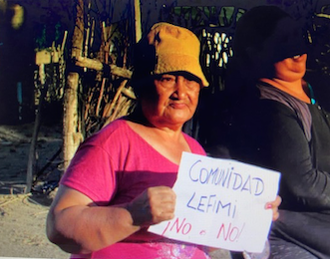Argentina: Indigenous communities threatened by mining giants

Screenshot
The Mapuche-Tehuelche communities in Southern Argentina held an emergency assembly on December 8 to discuss a legislative bill which seeks to impose a large-scale mining zone in their territories, omitting rights to consultation and participation provided in both the National and Provincial Constitutions.
The assembly took place in the territory of the aboriginal community Mallín de los Cual, in Gan Gan. Covid-19 safety measures and social distancing measures were observed. The Mapuche Tehuelche communities Mallín de los Cual, Los Pinos, Chacay Oeste and Laguna Fría, Taquetrén, Lagunita Salada, Cerro Bayo and Gorro Frigio, Yala Laubat and Lefimi were present at the meeting.
"The zoning envisaged by the Executive through this bill, currently in the Legislature, would directly affect the ancestral territories of the indigenous communities," they said. In a document addressed to the Legislature of Chubut on November 30, the aboriginal communities demanded that the Chamber refrain from advancing the mining zoning, since "it was drafted from Buenos Aires and in violation of the rights of Indigenous Peoples."
Since it purchased the Navidad project from Aquiline Resources in 2012, Canadian mining giant Pan American Silver has been backstage lobbying the Chubut Legislature in this matter. The Navidad silver-lead-zinc mine project is located in the central region, inhabited by the Mapuche-Tehuelche communities.
Just months ago Patagonia Gold secured ownership of Mina Angela, a mid-size mine closed in 1990. They propose to reopen the mine on a large scale. Amid the pandemic, Yamana Gold announced in April that it had agreed to let a privately held real estate and investment company acquire a 40% stake in the Suyai gold project in the area of Esquel.
Despite strong pressure from the mining lobby, led by Canadian multinationals Pan American Silver, Patagonia Gold and Yamana Gold, people know that the zoning bill is just another disguise for unsustainable and dirty mining practices.
Campaigners say the mining companies are trying to take advantage of restrictions imposed by the pandemic to push forward legislation on non-renewable resources. There have been many protests, declarations and demonstrations against these plans. The general consensus is towards clean and environmentally friendly investments in Chubut province.
In 2014 the Union of Assemblies of Communities of Chubut (UACCh) introduced the first Popular Initiative through the mechanism of direct democracy provided by the provincial constitution. Backed by 13,000 signatures, the proposal was tougher than the law 5001 and included explicit negative aspects of mining and specific minerals, such as uranium. However, the bill was later repealed by the then governor.
Again in October this year, the assemblies together with the indigenous communities, presented the Second Legislative Initiative bill at the Electoral Court of the capital of the province, Rawson, aimed at establishing parameters of environmental sustainability in mining operations and reinforcing the ban on open-pit mining passed in 2003.
The proposed Bill No 129/20 Second Popular Initiative achieved parliamentary status on November 23rd with the support of more than 30,000 signatures. The legislative initiative also has the support of the Deliberative Councils of Madryn, Pirámides, Rawson, Esquel, Trevelin, Lago Puelo, Epuyén, El Hoyo, Río Pico and José de San Martín.
Researchers from the National Technological University (UTN) and Chubut Regional College, questioned the project presented by the provincial government to enable mega-mining in the central plateau. "A zoning for a single activity is a mistake", they stated, specifying that "the pertinent thing is to approach the evaluation and territorial planning in a comprehensive manner, taking into account the multiple socio-environmental facets of the territory. Sectoral zoning only for mining will fragment the territory and harm other activities due to incompatibilities and competition in land use," they argued, "in addition to exposing the water quality of the Chubut River, which supplies numerous productive activities and 50% of the population, to degradative processes."
Argentina's Nobel Prize winner Perez Esquivel sent a letter to the provincial government proclaiming that "Chibut has only one river!" A letter from the Justice and Peace Service denounced the mega mining scheme saying it was using method reminiscent of dictatorships, encroaching on the environment without consulting the community.
The Argentine Catholic Information Agency (AICA) announced that the bishops of Chubut once again also rejected the bill and asked Governor Arcioni to desist from the zoning plan.
LINKS
Letter from Nobel Prize winner Pérez Esquivel : www.laizquierdadiario.com/Perez-Esquivel-y-el-Serpaj-denuncian-la-avanzada-represiva-y-megaminera-en-Chubut
Bishops of Chubut once again say NO to a mega-mining project - https://aica.org/noticia-los-obispos-del-chubut-vuelven-a-decir-no-a-un-proyecto-megaminero
Video of the march in Esquel on December 4: https://youtu.be/AzAr80NrtdQ
Video of the December 4 march in support of Bill No. 129/20 Second Popular Initiative carried out in Trelew Radio 3: https://youtu.be/mr3gu1XA_Jg


















